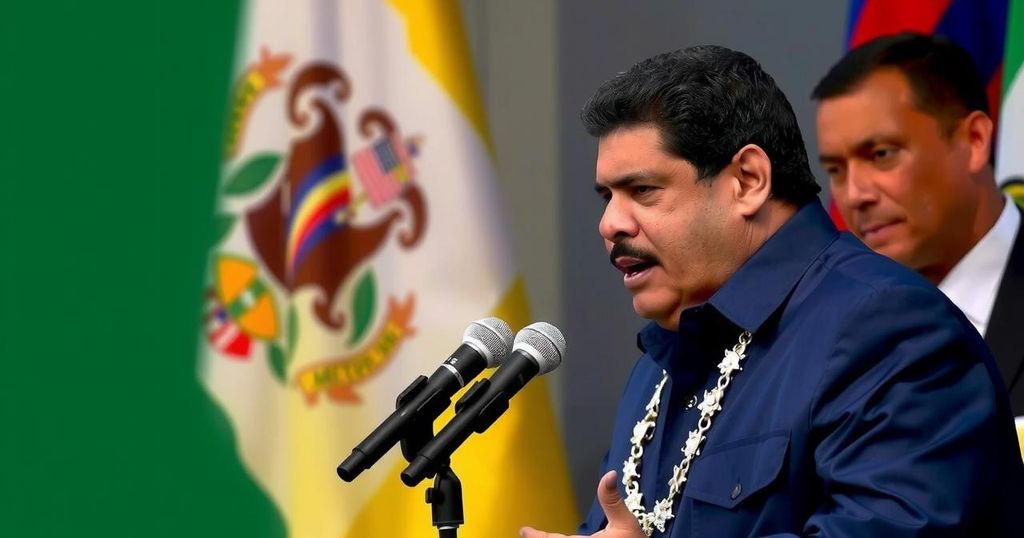The Prime Minister of Saint Vincent and the Grenadines, Dr. Ralph Gonsalves, asserts that Nicolas Maduro’s presidency benefits Guyana amidst its oil sector growth. He actively supports dialogue and peace with Venezuela while advocating against military aggression related to territorial disputes. Gonsalves views the recent Venezuelan elections as fair and critiques U.S. interventionism in the region.
Dr. Ralph Gonsalves, Prime Minister of Saint Vincent and the Grenadines, recently expressed his belief that the continued presidency of Nicolas Maduro in Venezuela serves to benefit the emerging oil sector in Guyana. In a visit to Guyana to pay respects at the funeral of the esteemed Sir Shridath Ramphal, Gonsalves shared his perspective with Demerara Waves Online News, stating that the Venezuelan populace’s choice to reject the right-wing opposition ultimately enhances Guyana’s security in terms of its rapidly growing oil industry. Gonsalves emphasized, “If you have a choice between Maduro and the right wing in Venezuela, I advise you to choose Maduro. The right wing will seek to allow the Americans to take the oil in Venezuela, to set up to take over PDVSA (the state oil company) and try to run Guyana’s oil industry from Caracas.” The Prime Minister, who was among the first Caribbean leaders to congratulate Maduro following the recent elections, affirmed his opposition to any military aggression concerning Guyana’s territory, specifically the Essequibo Region. He declared, “Anytime, if Venezuela attempts to do anything militarily, you’ll hear that I speak against it… Under anybody. No war. You have a problem, you talk about it, you solve it. I want peace between Venezuela and Guyana.” In discussing the regional dynamics, Gonsalves hailed St. Vincent and the Grenadines alongside Brazil for their roles in facilitating dialogue and peace, specifically through the Argyle Declaration promoting amicable relations between Presidents Ali of Guyana and Maduro of Venezuela. He highlighted the historical conduct of the Venezuelan right wing, noting their continuous antagonism towards Guyana regarding territorial claims, particularly for the Essequibo. Furthermore, Gonsalves defended his conclusion that the Venezuelan elections held on July 28, 2024, were conducted fairly, referencing the United States’ historical interference in regional politics. He stated, “America can’t teach me about elections and democracy. In my lifetime, I watched what has happened.” This commentary came amidst discussions regarding Guyana’s desire for election observation and the growing U.S. investments in their oil and gas sectors alongside Suriname. U.S. Ambassador to Guyana and CARICOM, Nicole Theriot, expressed disappointment over the lack of support from various nations for a joint statement advocating for electoral verification. In contrast, Gonsalves remarked on his strong and positive relationships with the United States, dismissing claims of being anti-American while acknowledging the historical context of U.S. foreign policy in the Caribbean.
The relationship between Venezuela and Guyana has been historically complicated, especially given the ongoing territorial disputes over the Essequibo Region. The arrival of oil wealth fundamentally alters the geopolitical landscape in this region, inviting interest from external powers such as the United States. Prime Minister Ralph Gonsalves’ comments reflect a broader strategic perspective within CARICOM, emphasizing the need for diplomatic engagement rather than military confrontation. The backdrop of the Venezuelan elections and regional leadership ties into narratives of security and economic interests for Guyana, which is facing substantial foreign investment in its oil sector.
In summary, Prime Minister Dr. Ralph Gonsalves underscores the notion that Maduro’s presidency is advantageous for Guyana’s interests, particularly in the context of its burgeoning oil industry. He advocates for peace, diplomacy, and a rejection of military intervention, positioning himself as an ally in fostering regional stability. His critique of U.S. historical practices in Latin America further complements his perspective on the recent Venezuelan elections, promoting a nuanced understanding of Caribbean geopolitics.
Original Source: caribbean.loopnews.com







